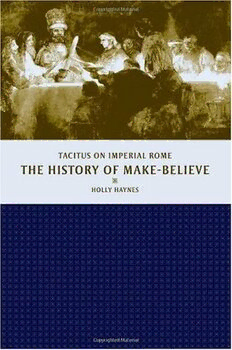
The History of Make-Believe: Tacitus on Imperial Rome PDF
247 Pages·2003·1.426 MB·English
Most books are stored in the elastic cloud where traffic is expensive. For this reason, we have a limit on daily download.
Preview The History of Make-Believe: Tacitus on Imperial Rome
Description:
A theoretically sophisticated and illuminating reading of Tacitus, especially the Histories, this work points to a new understanding of the logic of Roman rule during the early Empire.Tacitus, in Holly Haynes' analysis, does not write about the reality of imperial politics and culture but about the imaginary picture that imperial society makes of these concrete conditions of existence--the "making up and believing" that figure in both the subjective shaping of reality and the objective interpretation of it. Haynes traces Tacitus's development of this fingere/credere dynamic both backward and forward from the crucial year A.D. 69. Using recent theories of ideology, especially within the Marxist and psychoanalytic traditions, she exposes the psychic logic lurking behind the actions and inaction of the protagonists of the Histories. Her work demonstrates how Tacitus offers penetrating insights into the conditions of historical knowledge and into the psychic logic of power and its vicissitudes, from Augustus through the Flavians.By clarifying an explicit acknowledgment of the difficult relationship between res and verba, in the Histories, Haynes shows how Tacitus calls into question the possibility of objective knowing--how he may in fact be the first to allow readers to separate the objectively knowable from the objectively unknowable. Thus, Tacitus appears here as going further toward identifying the object of historical inquiry--and hence toward an "objective" rendering of history--than most historians before or since.
See more
The list of books you might like
Most books are stored in the elastic cloud where traffic is expensive. For this reason, we have a limit on daily download.
